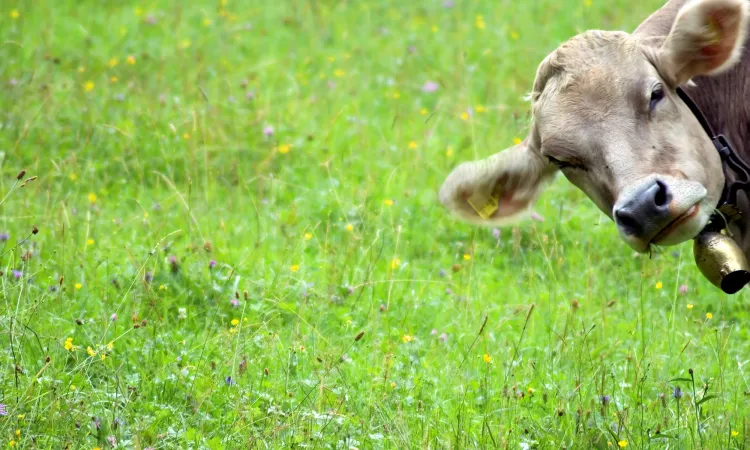Carbon dioxide is often highlighted in discussions about climate change, but methane is a more potent greenhouse gas, trapping 28 times more heat per molecule than CO2, according to the U.S. Environmental Protection Agency. Recent reports and scientific papers have underscored the significant impact of animal production on climate change. Denmark has become the first country in the world to tax cows, sheep and pigs based on their methane emissions. Contrary to common belief, only 1% of this methane comes from farting, with the rest produced through belching. The average cow emits up to 441 lbs (200 kg) of methane annually, and the Danish green think tank Concito reports that in Denmark, cows also produce 5.9 tons (6.0 tonnes) of CO2.
The UN Environment Programme states that livestock accounts for 32% of human-caused methane emissions, a figure that has risen significantly since the COVID-19 pandemic began in 2020. Besides livestock, landfills and oil and natural gas systems also emit methane, with Denmark reporting 1,484,377 cows in the country as of June 30, 2022, slightly fewer than the previous year. Over 60% of Denmark is farmland, making it one of the most cultivated countries globally, alongside Bangladesh, and Danish people are among the highest consumers of beef worldwide.
Denmark aims to cut greenhouse gas emissions by 70% from 1990 levels by 2030. Starting in 2030, cows, pigs and sheep will be taxed at 300 Danish kroner (£34) per ton of CO2 equivalent, including methane, with the tax increasing to 750 kroner (£85) by 2035. Initially, however, a 60% tax reduction means the tax will be 120 kroner (£13.6) and later, 300 kroner. This approach mirrors the taxes on carbon-heavy industries introduced in 2022.
Taxation Minister Jeppe Bruus hailed the methane tax as a pioneering step toward making Denmark climate-neutral, expressing hope that other countries would follow suit. The tax deal, reached after months of negotiation, involved the centre-right coalition government, farmers, industry representatives, unions and others. Foreign Minister Lars Løkke Rasmussen described it as part of “the biggest transformation of the Danish landscape in recent times.”
New Zealand had passed a similar law, dubbed the “burp tax,” set to take effect in 2025. However, following criticism from farmers and a shift in government from a centre-left coalition to a centre-right one after the 2023 election, the policy was abandoned. Andrew Hoggard, head of New Zealand’s main agriculture lobbying group, argued that the tax would severely impact rural communities. New Zealand’s International Trade Administration noted that cows and sheep outnumber people in the country by seven to one.
European farmers have also voiced concerns that climate change measures threaten their livelihoods. Protests have included blocking roads with tractors and throwing eggs at the European Parliament. Farmers suggest that incentivising sustainable farming practices through subsidies is preferable to penalising them with taxes. Niels Peter Norring of the Danish Agriculture & Food Council warned that the tax could push jobs abroad, while the Danish farmers’ group Bæredygtigt Landbrug called it “a scary experiment” hindering green investments in agriculture. Peder Tuborgh, CEO of Arla Foods, acknowledged the tax’s potential benefits but argued that farmers making efforts to reduce emissions should not be penalised. Kristian Hundeboll, CEO of the DLG Group, stressed that EU-wide legislation is crucial for maintaining competitiveness, as Denmark acting alone offers no advantage.
EU prospects for similar actions dimmed when legislation to restore degraded habitats failed, largely due to concerns about losing farmland. Countries like Belgium, Hungary, Italy and Poland opposed or abstained from the vote, pressured by the agriculture industry.
The Danish Society for Nature Conservation lauded the methane tax as a “historic compromise.” The Danish government estimates it will reduce emissions by 1.7 to 2.6 million tons (1.8 to 2.6 million tonnes) by 2030, helping to meet climate targets. A 2022 report for the European Commission noted that agriculture is Denmark’s largest source of methane emissions at 25%, compared to 24% from transport and 19% from energy. Ten years ago, agriculture’s share was 16% lower, and it is projected to reach 40% by 2030 without new policies. The Danish parliament is expected to pass the law soon.
Improving animal husbandry and adding feed additives could also reduce methane emissions, although these measures are in early stages and unlikely to have a significant impact soon. Selectively breeding low-methane livestock might reduce product quality, and some food additives may not meet Danish animal welfare standards.
Denmark plans to invest 40 billion kroner (£4.5 billion) in environmental measures, including reforestation and wetland creation. Reforestation will cover 617,000 acres (250,000 hectares) of agricultural land by 2045. The government intends to reinvest tax proceeds into the industry, with reforestation being one such measure.





















